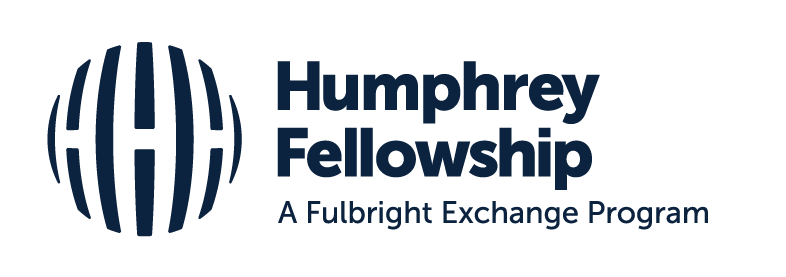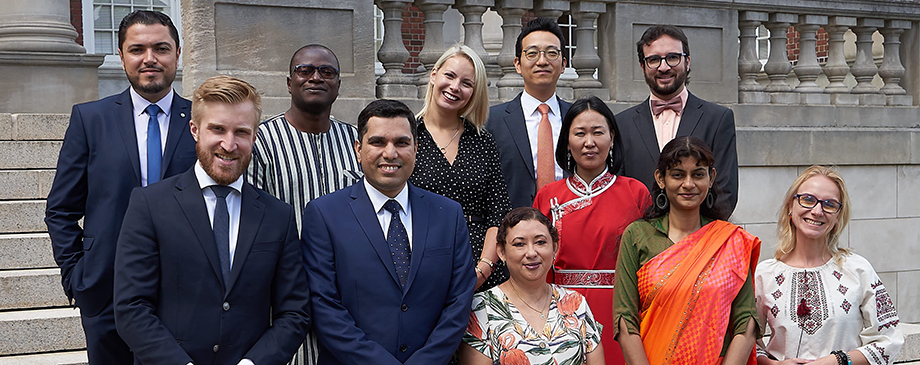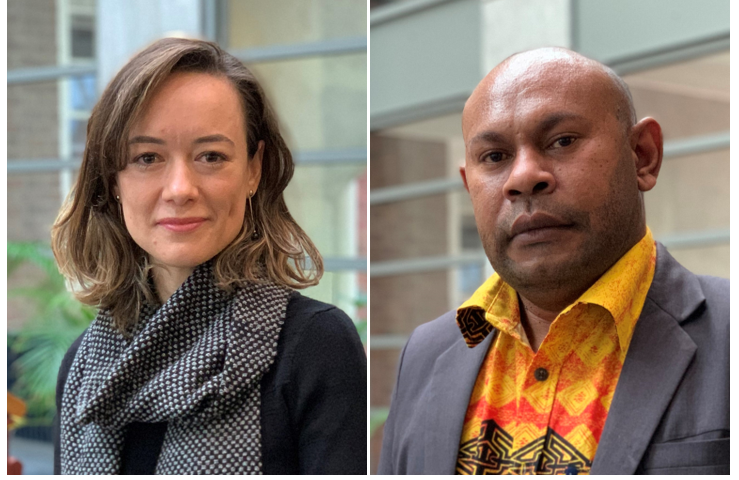
Nine Hubert H. Humphrey Fellows from Brazil, Guatemala, Mexico, Montenegro, Nepal, Papua New Guinea, South Africa, Tanzania and Togo visited with the LaunchPad team last week as part of a cross cultural exchange program. The Fellows are young and midcareer professionals from the public, private and NGO sectors who bring rich experience in public policy, public health, public finance, economic development, workforce and youth development, technology, volunteerism and community building, as well as other areas.
The program is sponsored by the U.S. Department of State with funding provided by the U.S. government and administered by the Institute of International Education.
Affiliated with the Fulbright Exchange Program, it gives emerging global leaders access to non-degree graduate-level study, leadership development and professional collaboration with U.S. counterparts.
The nine Humphrey Fellows are being hosted at Syracuse by the Maxwell School of Citizenship and Public Affairs where they are engaging in an intensive program of study, professional development and cultural exchange. Syracuse University is one of 12 campuses across the country to host Humphrey Fellows.

Because of COVID-19 regulations, the LaunchPad visit was virtual, but animated and robust. The Fellows engaged in a conversation with LaunchPad executive director Linda Dickerson Hartsock and Claire Howard ’23, a LaunchPad Global Fellow majoring in economics and international relations in the Maxwell School.
Hartsock provided a historical context for the evolution of innovation and entrepreneurship programs in communities across country dating back to the first incubator in the U.S., “hatched” on an egg farm to “incubate” new businesses just outside of nearby Rochester in the 1950s. Its goal was not to build high tech startups, but to bring economic viability and sustainability to post-industrial communities that were losing factories to other places around the country and the world. The movement to launch homegrown businesses spread across the U.S. with literally thousands of local incubators and working spaces in communities of all sizes. In the past ten years there has been a ten-fold growth in equity-based technology accelerators across the country that have launched unicorns like Airbnb, Dropbox, Stripe, Reddit and Twitch.
Syracuse University was one of the first colleges to create academic programs in this subject matter. The Entrepreneurship and Emerging Enterprises program at Whitman is 20 years old and was followed by the IDS program at the iSchool with its flagship programs, the Student Sandbox. The SU Student Sandbox, located at the Tech Garden, a downtown Syracuse incubator, was the first U.S. Economic Development Administration University Center for student entrepreneurship in the country. That was less than 15 years ago. Now, incubators are mainstays on college campuses at nearly every college in the country, typically housed in business schools or in downtown business districts.
Syracuse University continued to be at the front of innovation when it opened the Blackstone LaunchPad & Techstars in spring 2016. It was the first program of its kind in the country to be located in a college library, recognizing the importance of building an interdisciplinary program, and celebrating the role of a university library as an innovation hub.
Hartsock explains that it serves 4,500 students from every academic program who are working on products, services and technologies in the areas such as cleantech, fintech, medtech, hardware, software and consumer goods, digital media, e-commerce, and the creative sectors. It also has a strong focus on career development, recognizing that young people need to develop entrepreneurial mindsets, and that the goal of programs like the LaunchPad is to create global citizens who will be innovation leaders across all sectors of life.
Claire Howard expanded on social impact entrepreneurship, which is a strong area of focus for the LaunchPad. She spoke from her perspective working with student entrepreneurs tackling social issues such as food access, equity, the environment, public health, and other “wicked problems.” She also offered her perspective as the campus ambassador for the Hult Prize which is a partnership between the Hult International Business School, the United Nations Office of Partnerships, and the Hult Prize Foundation. The Hult Prize is a global competition for solutions to annual challenges. With a $1 million grand prize, it is considered the Nobel Prize of student impact entrepreneurship. Syracuse University hosts annual Hult Prize competitions and was selected to host a Hult Prize Regional Summit later this spring.

Humphrey Fellows shared their perspectives on how innovation ecosystems are structured in their countries and some of the challenges that come with introducing innovation in government, particularly around the issue of sustainability related to leadership change.
The group discussed the components that go into building a successful ecosystem, and how to mobilize resources and support for grassroots efforts to accelerate technology adoption and innovation initiatives. They shared success stories, and their own journeys to help shape change in their organizations and home communities.
The conversation also focused on how to engage young people – particularly Generation Z – in creating new business, and also in creating new models for engagement and citizenship.
As a Maxwell student, Howard was particularly pleased to engage with the guests. “Each Humphrey Fellow, coming from a unique background, offered a thoughtful and eye-opening perspective on entrepreneurship around the world while affirming that innovation is a universal human drive that brings joy and positive social impact. Meeting them afforded me the opportunity to learn how they are making the world a better place through their own vision and passion for becoming change agents in their own organizations, communities and respective countries.”
“I was very impressed to know that an objective of LaunchPad is to launch entrepreneurs, not all of whom will necessarily launch companies, said Humphrey Fellow Débora Targino Teixeira, from Brazil. “Coming from an organization that believes in the power of entrepreneurs to transform the world – regardless of where they are – it was very gratifying to see that Syracuse University also follows this premise.”
Some Fellows travelled internationally to learn about innovation and technology. Humphrey Fellow Jordan Dean from Papua New Guinea is looking forward to opportunities at LaunchPad.
“I’d like to learn more about the innovation ecosystem here at Syracuse University and LaunchPad. I am also keen to join to see how we can collaborate with my office back in Papua New Guinea.”
“Humphrey Fellows approach innovation and entrepreneurship in a myriad of ways, given the many countries and organizations they hail from,” said Margaret Lane, director of the Humphrey Fellowship Program at Syracuse University. “The LaunchPad enables them to share ideas, collaborate, innovate and discover new ways of thinking in order to make an impact after their fellowship.”
“The conversation about how the U.S. looks at innovation, especially within public policy, and the sharing of perspectives certainly resonated with the fellows,” added Martha Haddad Ketcham, associate coordinator of the Humphrey Fellowship Program and a coordinator for executive education at the Maxwell School. “Hopefully this is the start of some fantastic networking and engagement with the numerous initiatives at the LaunchPad.”